At NaDI, researchers provide innovative solutions to the new societal challenges posed by the digital revolution (eGov, eHealth, eServices, Big data, etc.). Coming from a variety of disciplines, researchers combine their expertise in IT, technology, ethics, law, management or sociology. Grouping six research centers from various disciplines, the Namur Digital Institute offers a unique multidisciplinary expertise to all areas of informatics, its applications and its social impact.
Among its main competencies are formal methods, man-machine interface, requirement engineering, modeling techniques to reason and design complex software systems, testing, quality insurance, software product lines, data bases, big data, machine learning and more generally artificial intelligence, security, privacy, ethics by design, technology assessment and legal reasoning.

Read more
This content is currently being migrated. We invite you to visit the external page of the research institute.
Spotlight
News
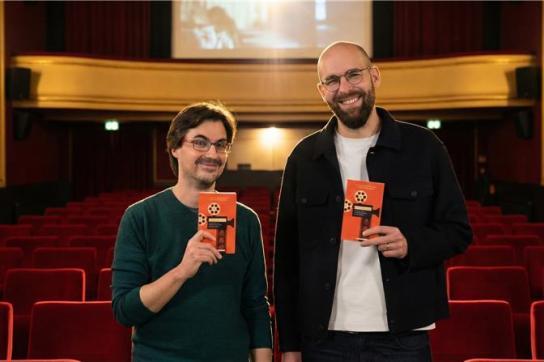
Twenty films to understand digital technology: a fun challenge taken up by two experts from UNamur
Twenty films to understand digital technology: a fun challenge taken up by two experts from UNamur
Terminator to talk about AI? Wall-E to talk about technological dependence? The Truman Show to discuss social media? In a new book, two professors from UNamur, Anthony Simonofski (digital transformation—EMCP Faculty—NaDI Institute) and Benoît Vanderose (software engineering—Faculty of Computer Science—NaDI Institute), take readers on a journey at the crossroads of digital technology and cinematic imagination.
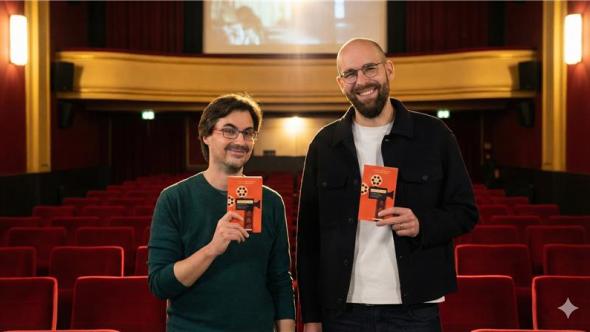
Their book "Cinématech - Twenty Works to Understand Digital Technology" is primarily educational in nature, as it allows readers to better understand digital technology and its challenges. But the originality of the approach chosen by the two authors makes it both entertaining and informative.
"The idea is simple: use 20 films and series to illustrate the history of digital technology, three important technologies (AI, robotics, XR) and their challenges. To do this, we start with Terminator, Her, Wall-E, Minority Report, and many others to make these subjects accessible," explains Anthony Simonofski, Professor in the Faculty of Economics, Management, Political Science, and Communication (EMCP).
Published by the Royal Academy of Sciences, Letters, and Fine Arts of Belgium, the book is an extension of the Pop-Code podcast produced by the two experts and film buffs. In it, they explore the use of pop culture to educate people about digital technology, while examining its challenges and limitations.
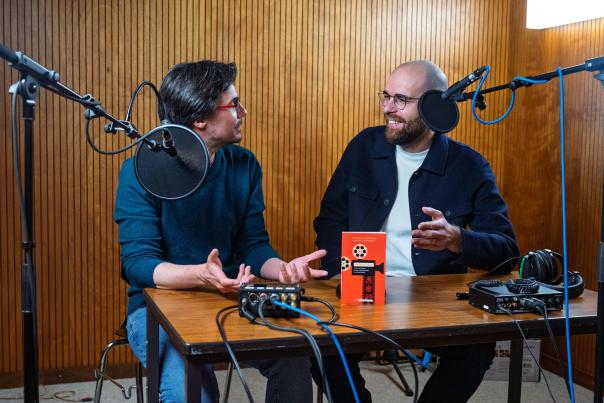
"With the book, we can expand on the podcast's content, providing greater consistency and scientific references," explains Benoit Vanderose, professor in the Faculty of Computer Science.
This new book is aimed at three audiences:
- Those who want to better understand digital technology without jargon
- Film buffs curious to see their favorite works from a different angle
- Teachers and trainers looking for concrete materials to discuss digital technology in the classroom
Digital sessions at UNamur and a research project
In addition to the Pop-Code podcast and the book Cinématech, Benoit Vanderose and Anthony Simonofski's project also takes the form of "digital sessions" organized at UNamur. What's on the program? Films followed by discussions with experts to understand the challenges of digital technology and stimulate collective reflection. In this project, Anthony Simonofski and Benoit Vanderose are joined by Anne-Sophie Collard and Fanny Barnabé. Next event? February 12 for a screening of I, Daniel Blake (Ken Loach) to talk about digital inclusion!
Also worth noting on the same theme: the ongoing research project - https://arc-projects.unamur.be/di-fic
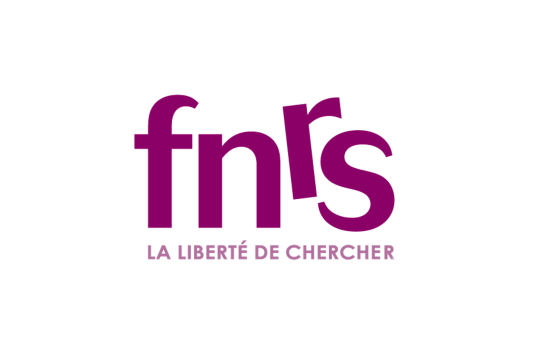
28 new research projects funded by the FNRS
28 new research projects funded by the FNRS
The F.R.S.-FNRS has just published the results of its various 2025 calls for proposals. These include the "Credits & Projects" and "WelCHANGE" calls, as well as the "FRIA" (Fund for Research Training in Industry and Agriculture) and "FRESH" (Fund for Research in the Humanities) calls, which aim to support doctoral theses. What are the results for UNamur? Twenty-eight projects have been selected, demonstrating the quality and richness of research at UNamur.

The "Credits & Projects" call for proposals resulted in 12 grants being awarded for ambitious new projects. These include two "equipment" grants, eight "research credits (CDR)" grants, and two "research projects (PDR)" grants, one of which is in collaboration with the ULB. The FRIA call for doctoral research support will fund eleven doctoral scholarships and the FRESH call will fund three.
Two prestigious Scientific Impulse Mandates (MIS) were also obtained. This three-year funding supports young permanent researchers who wish to develop an original and innovative research program by acquiring scientific autonomy within their department.
We would also like to highlight the two projects funded under the "WelCHANGE" call, a funding instrument for research projects with potential societal impact, led by a principal investigator in the humanities and social sciences.
Detailed results
Call for Equipment
- Xavier De Bolle, Narilis Institute, Co-promoter in collaboration with UCLouvain
- Luca Fusaro, NISM Institute
Call for Research Grants (CDR)
- Marc Hennequart, NARILIS Institute
- Nicolas Gillet, NARILIS Institute
- Jean-Yves Matroule, NARILIS Institute
- Patricia Renard, NARILIS Institute
- Francesco Renzi, NARILIS Institute
- Stéphane Vincent, NISM Institute
- Laurence Meurant, NaLTT Institute
- Emma-Louise Silva, NaLTT Institute
Call for Research Projects (PDR)
- Jérémy Dodeigne, Transitions Institute, Co-supervisor in collaboration with ULB
- Luc Henrard, NISM Institute; Co-supervisor: Yoann Olivier, NISM Institute
Fund for Training in Research in Industry and Agriculture (FRIA)
- Emma Bongiovanni - Supervisor: Catherine Michaux, NISM Institute
- Simon Chabot - Supervisor: Carine Michiels, Narilis Institute; Co-supervisor: Anne-Catherine Heuskin, Narilis Institute
- Lee Denis - Supervisor: Muriel Lepère, ILEE Institute
- Maé Desclez - Supervisor: Johan Yans, ILEE Institute; Co-supervisor: Hamed Pourkhorsandi (University of Toulouse)
- Pierre Lombard - Supervisor: Benoît Muylkens, Narilis Institute; Co-supervisor: Damien Coupeau, Narilis Institute
- Amandine Pecquet - Supervisor: Nicolas Gillet, Narilis Institute; Co-supervisor: Damien Coupeau, Narilis Institute
- Kilian Petit - Supervisor: Henri-François Renard, Narilis Institute; Co-supervisor: Xavier De Bolle, Narilis Institute
- Simon Rouxhet - Supervisor: Catherine Michaux, NISM Institute; Co-supervisor: Nicolas Gillet, Narilis Institute
- William Soulié - Supervisor: Yoann Olivier, NISM Institute
- Elisabeth Wanlin - Supervisor: Xavier De Bolle, Narilis Institute
- Laura Willam - Supervisor: Frédérik De Laender, ILEE Institute
Fund for Research in the Humanities (FRESH)
- Louis Droussin - Supervisor: Arthur Borriello, Transitions Institute; Co-supervisor: Vincent Jacquet, Transitions Institute
- Nicolas Larrea Avila - Supervisor: Guilhem Cassan, DeFIPP Institute
- Victor Sluyters – Supervisor: Wafa Hammedi, NADI Institute
- Amandine Leboutte - Co-supervisor: Erika Wauthia (UMons); Co-supervisor: Cédric Vanhoolandt, IRDENa Institute.
Scientific Impulse Mandate (MIS)
- Charlotte Beaudart, Narilis Institute
- Eli Thoré ILEE Institute
WelCHANGE Call
- Nathalie Burnay Transitions Institute, in collaboration with UCLouvain
- Catherine Guirkinger, DeFIPP Institute
Congratulations to all!
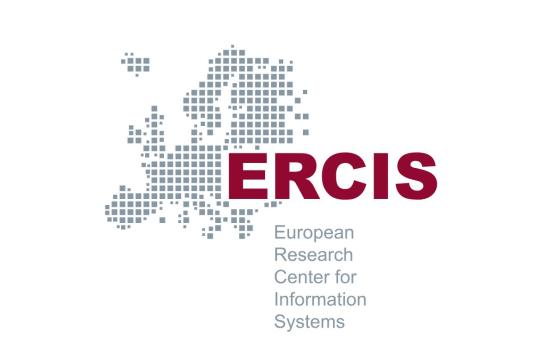
UNamur joins ERCIS, Europe's leading information systems network
UNamur joins ERCIS, Europe's leading information systems network
The University of Namur takes another step forward in its commitment to supporting digital transformation. It is joining the prestigious European Research Center for Information Systems (ERCIS) network as a Partner Institution, via the MINDIT research center (Management de l'Information et Transformation Numérique).

The ERCIS network brings together universities and companies from 25 - mainly European - countries around a common goal: to advance information systems research and meet the challenges of digital transformation. To achieve this, the ERCIS network emphasizes collaborative research, innovation and knowledge sharing.

Joining ERCIS is a fine mark of recognition for the expertise developed by MINDIT and a fantastic opportunity to nurture our research and teaching with an international dimension.
In practical terms, this membership paves the way for training opportunities for MINDIT researchers and PhD students: networking events, annual workshops, summer school or PhD Colloquium. It also creates bridges to develop partnerships at the level of academic programs.
Finally, ERCIS relies on a corporate advisory board, guaranteeing synergy between research and field practices.
MINDIT Research Center
Since 2024, the MINDIT Research Center (NaDI) has been developing expertise in information systems, a field of research at the intersection of computer science and management. MINDIT's work explores the potential of new technologies (AI, Internet of Things, augmented reality, big data...) with the aim of meeting the concrete needs of the business world and public organizations. MINDIT brings together several academics such as Corentin Burnay (director), Isabelle Linden, Stéphane Faulkner and Annick Castiaux.

Digital literacy through fiction: NaDI's interdisciplinary initiative
Digital literacy through fiction: NaDI's interdisciplinary initiative
The Namur Digital Institute (NaDI) is launching a series of original events: "Les Séances du Numérique". Films followed by debates with experts to understand digital challenges and stimulate collective thinking. A project spearheaded by Anthony Simonofski, Anne-Sophie Collard, Benoît Vanderose and Fanny Barnabé.

The Digital Sessions are an initiative launched by the NaDI, the digital research institute at UNamur. The latter brings together researchers from the Faculties of law, informatics and EMCP.
To stimulate interdisciplinary collaboration, NaDI has launched a call for projects. One of the selected projects? Les Séances du Numérique, an original format in which fiction becomes the starting point for debate. Each meeting begins with a film screening, followed by an interdisciplinary conference on a digital-related social issue.
An outstanding first Séance du Numérique
To inaugurate the cycle, the team chose to screen The Social Network last May. The film traces the creation of Facebook by Mark Zuckerberg, and the debate focused on the moderation of social networks, a hot topic since the election of Donald Trump. Two experts led the discussion: Julien Albert, expert at the PReCISE center, and Jérémy Grossman, expert at CRIDS.

Educating through fiction
The ambition of these sessions is simple: to educate about digital issues through fiction, and to confront a variety of viewpoints.
This format extends the experience of the podcast Pop-Code already hosted by Anthony Simonofski and Benoît Vanderose, but with an added dimension: interdisciplinarity and direct exchange with the audience. After the film, everyone can question the experts and enrich the reflection.
What next?
Digital technology will be at the heart of future screenings, with a dynamic that is both collaborative and rooted in current affairs:
- Fostering collaboration between several NaDI centers to bring disciplines into dialogue (as was the case at the first session with CRIDS and PReCISE).
- Bouncing off themes linked to current events to guarantee the relevance of exchanges.
Four sessions will be offered per year, open to all, with one priority: reaching out to citizens. The films are there to give the event a cultural and scientific outreach.
Eventually, the team would like to diversify its formats: screenings in cinemas like Caméo, broadcasting series, even playconferences where we play a video game during the debate. The idea: to use fiction in all its forms to kick-start discussion.
The team behind the project
- Fanny Barnabé, lecturer at CRIDS / NaDI
- Anne-Sophie Collard, professor at the EMCP Faculty
- Anthony Simonofski, professor at the EMCP Faculty
- Benoît Vanderose, professor at the Computer Science Faculty
In collaboration with the Knowledge Confluence and the Administration de la communication
Next session: November 4 - "Does AI have a conscience?"
Projection of the film Ex Machina followed by a discussion with Isabelle Linden and Benoît Frenay.
Think, think: is the human being still unique?
Behind the AI revolution, a question arises: does AI have a conscience? For this second screening-debate of Séances du Numérique, we invite you to dive into the film Ex_machina, a troubling face-off between creation and creator, between human and machine, between future and humanity.
Program:
- 5pm: Welcome & film presentation
- 5:15pm: Screening of the film Ex machina
- 7:05pm: Debate "Does AI have a conscience? " (with Isabelle Linden & Benoît Frenay)
- 19h45: end
Two experts will take part in the debate:
- Benoît Frenay, who will shed light on the learning logics of today's artificial intelligences and the limits of their "autonomy". Can we really speak of intelligence without consciousness? How far can imitation go?
- Isabelle Linden, who will question the very foundations of what we call "thinking" in a computer logic. Can we create a conscious machine? Or are we merely facing mirrors of our own desires?


Twenty films to understand digital technology: a fun challenge taken up by two experts from UNamur
Twenty films to understand digital technology: a fun challenge taken up by two experts from UNamur
Terminator to talk about AI? Wall-E to talk about technological dependence? The Truman Show to discuss social media? In a new book, two professors from UNamur, Anthony Simonofski (digital transformation—EMCP Faculty—NaDI Institute) and Benoît Vanderose (software engineering—Faculty of Computer Science—NaDI Institute), take readers on a journey at the crossroads of digital technology and cinematic imagination.

Their book "Cinématech - Twenty Works to Understand Digital Technology" is primarily educational in nature, as it allows readers to better understand digital technology and its challenges. But the originality of the approach chosen by the two authors makes it both entertaining and informative.
"The idea is simple: use 20 films and series to illustrate the history of digital technology, three important technologies (AI, robotics, XR) and their challenges. To do this, we start with Terminator, Her, Wall-E, Minority Report, and many others to make these subjects accessible," explains Anthony Simonofski, Professor in the Faculty of Economics, Management, Political Science, and Communication (EMCP).
Published by the Royal Academy of Sciences, Letters, and Fine Arts of Belgium, the book is an extension of the Pop-Code podcast produced by the two experts and film buffs. In it, they explore the use of pop culture to educate people about digital technology, while examining its challenges and limitations.

"With the book, we can expand on the podcast's content, providing greater consistency and scientific references," explains Benoit Vanderose, professor in the Faculty of Computer Science.
This new book is aimed at three audiences:
- Those who want to better understand digital technology without jargon
- Film buffs curious to see their favorite works from a different angle
- Teachers and trainers looking for concrete materials to discuss digital technology in the classroom
Digital sessions at UNamur and a research project
In addition to the Pop-Code podcast and the book Cinématech, Benoit Vanderose and Anthony Simonofski's project also takes the form of "digital sessions" organized at UNamur. What's on the program? Films followed by discussions with experts to understand the challenges of digital technology and stimulate collective reflection. In this project, Anthony Simonofski and Benoit Vanderose are joined by Anne-Sophie Collard and Fanny Barnabé. Next event? February 12 for a screening of I, Daniel Blake (Ken Loach) to talk about digital inclusion!
Also worth noting on the same theme: the ongoing research project - https://arc-projects.unamur.be/di-fic

28 new research projects funded by the FNRS
28 new research projects funded by the FNRS
The F.R.S.-FNRS has just published the results of its various 2025 calls for proposals. These include the "Credits & Projects" and "WelCHANGE" calls, as well as the "FRIA" (Fund for Research Training in Industry and Agriculture) and "FRESH" (Fund for Research in the Humanities) calls, which aim to support doctoral theses. What are the results for UNamur? Twenty-eight projects have been selected, demonstrating the quality and richness of research at UNamur.

The "Credits & Projects" call for proposals resulted in 12 grants being awarded for ambitious new projects. These include two "equipment" grants, eight "research credits (CDR)" grants, and two "research projects (PDR)" grants, one of which is in collaboration with the ULB. The FRIA call for doctoral research support will fund eleven doctoral scholarships and the FRESH call will fund three.
Two prestigious Scientific Impulse Mandates (MIS) were also obtained. This three-year funding supports young permanent researchers who wish to develop an original and innovative research program by acquiring scientific autonomy within their department.
We would also like to highlight the two projects funded under the "WelCHANGE" call, a funding instrument for research projects with potential societal impact, led by a principal investigator in the humanities and social sciences.
Detailed results
Call for Equipment
- Xavier De Bolle, Narilis Institute, Co-promoter in collaboration with UCLouvain
- Luca Fusaro, NISM Institute
Call for Research Grants (CDR)
- Marc Hennequart, NARILIS Institute
- Nicolas Gillet, NARILIS Institute
- Jean-Yves Matroule, NARILIS Institute
- Patricia Renard, NARILIS Institute
- Francesco Renzi, NARILIS Institute
- Stéphane Vincent, NISM Institute
- Laurence Meurant, NaLTT Institute
- Emma-Louise Silva, NaLTT Institute
Call for Research Projects (PDR)
- Jérémy Dodeigne, Transitions Institute, Co-supervisor in collaboration with ULB
- Luc Henrard, NISM Institute; Co-supervisor: Yoann Olivier, NISM Institute
Fund for Training in Research in Industry and Agriculture (FRIA)
- Emma Bongiovanni - Supervisor: Catherine Michaux, NISM Institute
- Simon Chabot - Supervisor: Carine Michiels, Narilis Institute; Co-supervisor: Anne-Catherine Heuskin, Narilis Institute
- Lee Denis - Supervisor: Muriel Lepère, ILEE Institute
- Maé Desclez - Supervisor: Johan Yans, ILEE Institute; Co-supervisor: Hamed Pourkhorsandi (University of Toulouse)
- Pierre Lombard - Supervisor: Benoît Muylkens, Narilis Institute; Co-supervisor: Damien Coupeau, Narilis Institute
- Amandine Pecquet - Supervisor: Nicolas Gillet, Narilis Institute; Co-supervisor: Damien Coupeau, Narilis Institute
- Kilian Petit - Supervisor: Henri-François Renard, Narilis Institute; Co-supervisor: Xavier De Bolle, Narilis Institute
- Simon Rouxhet - Supervisor: Catherine Michaux, NISM Institute; Co-supervisor: Nicolas Gillet, Narilis Institute
- William Soulié - Supervisor: Yoann Olivier, NISM Institute
- Elisabeth Wanlin - Supervisor: Xavier De Bolle, Narilis Institute
- Laura Willam - Supervisor: Frédérik De Laender, ILEE Institute
Fund for Research in the Humanities (FRESH)
- Louis Droussin - Supervisor: Arthur Borriello, Transitions Institute; Co-supervisor: Vincent Jacquet, Transitions Institute
- Nicolas Larrea Avila - Supervisor: Guilhem Cassan, DeFIPP Institute
- Victor Sluyters – Supervisor: Wafa Hammedi, NADI Institute
- Amandine Leboutte - Co-supervisor: Erika Wauthia (UMons); Co-supervisor: Cédric Vanhoolandt, IRDENa Institute.
Scientific Impulse Mandate (MIS)
- Charlotte Beaudart, Narilis Institute
- Eli Thoré ILEE Institute
WelCHANGE Call
- Nathalie Burnay Transitions Institute, in collaboration with UCLouvain
- Catherine Guirkinger, DeFIPP Institute
Congratulations to all!

UNamur joins ERCIS, Europe's leading information systems network
UNamur joins ERCIS, Europe's leading information systems network
The University of Namur takes another step forward in its commitment to supporting digital transformation. It is joining the prestigious European Research Center for Information Systems (ERCIS) network as a Partner Institution, via the MINDIT research center (Management de l'Information et Transformation Numérique).

The ERCIS network brings together universities and companies from 25 - mainly European - countries around a common goal: to advance information systems research and meet the challenges of digital transformation. To achieve this, the ERCIS network emphasizes collaborative research, innovation and knowledge sharing.

Joining ERCIS is a fine mark of recognition for the expertise developed by MINDIT and a fantastic opportunity to nurture our research and teaching with an international dimension.
In practical terms, this membership paves the way for training opportunities for MINDIT researchers and PhD students: networking events, annual workshops, summer school or PhD Colloquium. It also creates bridges to develop partnerships at the level of academic programs.
Finally, ERCIS relies on a corporate advisory board, guaranteeing synergy between research and field practices.
MINDIT Research Center
Since 2024, the MINDIT Research Center (NaDI) has been developing expertise in information systems, a field of research at the intersection of computer science and management. MINDIT's work explores the potential of new technologies (AI, Internet of Things, augmented reality, big data...) with the aim of meeting the concrete needs of the business world and public organizations. MINDIT brings together several academics such as Corentin Burnay (director), Isabelle Linden, Stéphane Faulkner and Annick Castiaux.

Digital literacy through fiction: NaDI's interdisciplinary initiative
Digital literacy through fiction: NaDI's interdisciplinary initiative
The Namur Digital Institute (NaDI) is launching a series of original events: "Les Séances du Numérique". Films followed by debates with experts to understand digital challenges and stimulate collective thinking. A project spearheaded by Anthony Simonofski, Anne-Sophie Collard, Benoît Vanderose and Fanny Barnabé.

The Digital Sessions are an initiative launched by the NaDI, the digital research institute at UNamur. The latter brings together researchers from the Faculties of law, informatics and EMCP.
To stimulate interdisciplinary collaboration, NaDI has launched a call for projects. One of the selected projects? Les Séances du Numérique, an original format in which fiction becomes the starting point for debate. Each meeting begins with a film screening, followed by an interdisciplinary conference on a digital-related social issue.
An outstanding first Séance du Numérique
To inaugurate the cycle, the team chose to screen The Social Network last May. The film traces the creation of Facebook by Mark Zuckerberg, and the debate focused on the moderation of social networks, a hot topic since the election of Donald Trump. Two experts led the discussion: Julien Albert, expert at the PReCISE center, and Jérémy Grossman, expert at CRIDS.

Educating through fiction
The ambition of these sessions is simple: to educate about digital issues through fiction, and to confront a variety of viewpoints.
This format extends the experience of the podcast Pop-Code already hosted by Anthony Simonofski and Benoît Vanderose, but with an added dimension: interdisciplinarity and direct exchange with the audience. After the film, everyone can question the experts and enrich the reflection.
What next?
Digital technology will be at the heart of future screenings, with a dynamic that is both collaborative and rooted in current affairs:
- Fostering collaboration between several NaDI centers to bring disciplines into dialogue (as was the case at the first session with CRIDS and PReCISE).
- Bouncing off themes linked to current events to guarantee the relevance of exchanges.
Four sessions will be offered per year, open to all, with one priority: reaching out to citizens. The films are there to give the event a cultural and scientific outreach.
Eventually, the team would like to diversify its formats: screenings in cinemas like Caméo, broadcasting series, even playconferences where we play a video game during the debate. The idea: to use fiction in all its forms to kick-start discussion.
The team behind the project
- Fanny Barnabé, lecturer at CRIDS / NaDI
- Anne-Sophie Collard, professor at the EMCP Faculty
- Anthony Simonofski, professor at the EMCP Faculty
- Benoît Vanderose, professor at the Computer Science Faculty
In collaboration with the Knowledge Confluence and the Administration de la communication
Next session: November 4 - "Does AI have a conscience?"
Projection of the film Ex Machina followed by a discussion with Isabelle Linden and Benoît Frenay.
Think, think: is the human being still unique?
Behind the AI revolution, a question arises: does AI have a conscience? For this second screening-debate of Séances du Numérique, we invite you to dive into the film Ex_machina, a troubling face-off between creation and creator, between human and machine, between future and humanity.
Program:
- 5pm: Welcome & film presentation
- 5:15pm: Screening of the film Ex machina
- 7:05pm: Debate "Does AI have a conscience? " (with Isabelle Linden & Benoît Frenay)
- 19h45: end
Two experts will take part in the debate:
- Benoît Frenay, who will shed light on the learning logics of today's artificial intelligences and the limits of their "autonomy". Can we really speak of intelligence without consciousness? How far can imitation go?
- Isabelle Linden, who will question the very foundations of what we call "thinking" in a computer logic. Can we create a conscious machine? Or are we merely facing mirrors of our own desires?

Agenda
Offline, out of the game? Let's fight the digital divide.
Come and attend this new digital session!
A film conference offering a film and a debate on a major social issue related to digital technology. At the session on February 12, come and (re)discover Ken Loach's film I, Daniel Blake and debate the following question: Offline, out of the game? Let's fight the digital divide.

Program:
- 5:00 p.m.: Welcome & presentation of the film
- 5:15 p.m.: Screening of the film I, Daniel Blake
- 6:45 p.m.: Discussion: "Offline, out of the game? Let's fight the digital divide"
- 7:15 p.m.: End
Following the screening, three experts from the Namur Digital Institute (NADI), Simon Dechamps (MINDIT Research Center), Alix Gobert (CRIDS Research Center), and Floriane Goose (CeRCLe Research Center) will discuss the following questions: What is the digital divide? How does it conflict with the digitization of government agencies? How can we take users into account? Is digital inclusion a solution?
Women in Science 2026 | 6th edition
This annual event aims to promote women's and girls' access to science and technology and their full and equal participation. It highlights the important role of women in the scientific community and provides an excellent opportunity to encourage and promote equal opportunities for all genders in science and technology.
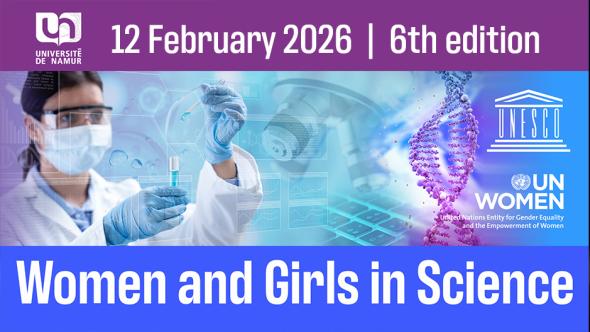
Our keynote speakers for 2026 are Professor Roosmarijn Vandenbroucke (Ghent University) and Professor Nelly Litvak (Eindhoven University of Technology).

